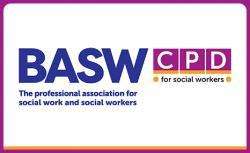
Brush up your skills and strengthen your practice alongside like minded social workers. We offer a variety of training courses on popular subjects at the core of social work.
With a mixture of general and more specialised topic areas, take a look at how we can help you advance your career and smash your continuing professional development goals.
Corporate multi booking rates available - contact ProfDE@basw.co.uk for more information
Click on the sessions below to find out more and book your place.
09.06.26 Safeguarding Adults Level 4: The role of the service provider lead
Delivered by BASW’s accredited training partner DCC-i via MS Teams.
9.30am - 4.30pm BASW Members £118.80 inc VAT, Corporate Package £142.80 inc VAT, Non Members £178.80 inc VAT
Since the implementation of the Care Act 2014, working with adults who may be at risk of harm and undertaking safeguarding adults’ enquiries has seen a shift in emphasis from process to personalised responses.
The Care Act section 42 duty of enquiry includes a range of actions undertaken or instigated by the Local Authority in response to an abuse or neglect concern in relation to an adult with care and support needs who is unable to protect themselves from the abuse or neglect or the risk of it. This one-day programme is designed for leads within provider service organisations, who will be responsible for the oversight and supervision of referrals and action plan, and in some cases s42 enquiries within the Safeguarding Adults Multi-Agency Procedures. It is mapped to level 4 of the Intercollegiate Guidance on Safeguarding Adults (RCN et al, 2019) and tailored for application in a provider service context.
Learning Outcomes:
This course will provide participants with the following learning outcomes:
- Increased understanding of the legal and policy framework of adult safeguarding and s42 enquiries, including knowledge of the different stages of an enquiry, how the safeguarding principles apply and the importance of defensible decision making within the process.
- Understanding of the responsibilities and accountabilities of own and partner organisations within the statutory process and multi-agency policies and procedures.
- To be able to know how/when to provide specialist advice to practitioners, both actively and reactively, including clarification about organisational policies, legal issues, and the management of adult safeguarding in a care and treatment setting. Awareness of core quality assurance measures as they apply to s42 in their organisations, including the standards required for robust recording and reporting.
- Understand the ethos, principles, and local application of Making Safeguarding Personal and be able to articulate this to staff and wider stakeholders.
- Understand the role and responsibilities, including lines of accountability in place to support the leadership role and responsibilities within local procedures and the organisation.
Learning Methods:
This training is delivered using an online interactive classroom approach and all delegates will be expected to take part to ensure an effective adult learning experience. Using whiteboards and breakout rooms, a combination of learning methods will be used throughout the day, including trainer presentation and group work in the form of case studies and reflection dilemmas to support application to practice. Local templates and expectations will be embedded in the programme where required and appropriate.
- Please note – for health and safety reasons it is not appropriate to access these courses from a mobile phone. Whilst tablets can be used; delegates will find a laptop is easier as functionality on tablets are still limited.
Resources Required: All delegates will need a laptop with a functioning Mic and Camera to allow effective participation. Laptops should have an up-to-date Browser such as Google Chrome or Microsoft Edge. Where possible delegates should be using the MS Teams App and have ensured it is fully updated.
Programme Outline
9.00 Log-in – Check your connection, camera & mic (the get a cuppa)
9.30 Introduction to the session and the tech
9.40 The legal and policy framework for safeguarding adults’ enquiries
- The role of the provider services safeguarding lead.
- The statutory duties in context
- Making safeguarding personal as an approach
- Multi-agency responsibilities and information sharing
11.00 COFFEE / SCREEN BREAK
11.20 Local safeguarding procedures and policies - application in practice
- purpose, proportionality, and processes
- the views and wishes of the person.
- working with families and social networks
- local thresholds and decision-making
12.15 When is it a criminal matter? Working with police colleagues in public services safeguarding contexts.
12.45 LUNCH / SCREEN BREAK
13.30 Quality assurance in practice
- Assessing competencies – setting and assuring standards in your organisation: clarity and responsibilities
- The role of audit in quality assurance.
- Providing safeguarding supervision and consultation in teams and organisations.
14.50 COFFEE BREAK
15.10 Supervising safeguarding in the team/organisation.
- Leadership for safeguarding within organisations.
- Safeguarding supervision – core skills and knowledge
- Tracking internal and external processes
- Roles and responsibilities at level 4: Self-assessment and development planning
16.15 Final feedback, questions, and evaluation
16.30 CLOSE
The Trainer:
Daisy Long, Chief Executive.
Daisy is a qualified and Social Work England registered social worker, who has spent a large part of her career working within integrated health and social care environments, providing and developing professional practice and leadership in health, social care and strategic settings. Daisy holds AMHP, BIA and PEPS 2 qualificationDaisy is well published, and also holds qualifications in Counselling, Practice Education, Mental Capacity, Mental Health, ILM Mentoring, Leadership & Management, and Training. She is Visiting Fellow at the National Centre for Cross Disciplinary Social Work (NCCDSW) at Bournemouth University, a role she has held since 2015. She is also Special Visiting Lecturer for the University of Wolverhampton Daisy is also a member of the BIHR Rites Group, BASW Professional Social Work magazine editorial advisory board and book review co-editor for the British Journal of Social Work (BJSW). Daisy oversees our business and consultancy projects and has particular expertise in relation to mental health, mental capacity, adult safeguarding and social justice related areas.
05.08.26 BIA & DoLS Legal Update
Delivered by BASW’s accredited training partner DCC-i via MS Teams.
9.15am - 4.30pm BASW Members £118.80 inc VAT, Corporate Package £168.00 inc VAT, Non Members £210 inc VAT
This one-day programme is designed as a peer learning experience and refresher, providing detailed case law/practice updates and a reflective space to support those working in-depth with MCA and DoLS processes, BIA colleagues in practice, authorisers, and mental health assessors to explore these current issues in practice.
The session will also improve their awareness of coming changes. This course delivers the requirements of continued learning as per the MCA/DoLS regulations for Best Interest Assessors.
Learning Methods: This is training is delivered using an online interactive classroom approach and all delegates will be expected to take part to ensure an effective adult learning experience. Using whiteboards and breakout rooms, a combination of learning methods will be used throughout the day, including trainer presentation and group work in the form of case studies and reflection dilemmas to support application to practice. Learning Outcomes: Attending this session will provide participants with the following outcomes:
• Provide the opportunity to engage with relevant annual CPD requirements as per DoLS regulations.
• Update knowledge in relation to recent case law rulings and their impact on DoLS practice.
• Explore issues of interface with other legislation and application in the community (MHA, Care Act).
• Understand the current intentions for the BIA-AMCP transition and consider what that might mean for future practice.
• Reflect & Analyse upon Capacity determinations and Best Interest decision making in the courts and in practice.
• Critically reflect with colleagues on complex practice issues and areas, for example assessing people with brain injuries or personality disorder.
Resources Required: All delegates will need a laptop with a functioning Mic and Camera to allow effective participation. Laptops should have an up-to-date Browser such as Google Chrome or Microsoft Edge. Where possible delegates should be using the MS Teams App and have ensured it is fully updated.
Programme Outline:
9.15 Please log on to MS Teams and join the meeting
9.30 Introductions & Explanation of online methods.
9.40 Session 1: Recent developments
Working with the MCA in practice: Implications for practice :-
- Practice in the post Covid world
- MCA and DoLS in the news
- Caselaw themes of note for practice
11.00 COFFEE BREAK / SCREEN BREAK
11.20 Session 2: Practice Issues
Assessing Capacity: evidence and the burden of proof.
- Salient information in relation to refusing assessments and/or care – the implications for both DoLS and LPS
- Fluctuating capacity in the courts and in practice.
- What does executive capacity mean in the courts and in practice?
12.45 LUNCH BREAK / SCREEN BREAK
13.30 Session 3: Practice Issues
- Exploring meaningful consultation
- Identifying the most appropriate RPR and engaging stakeholders
- Revisiting the threshold for objection
15.15 COFFEE BREAK / SCREEN BREAK
15:30 Session 4: Complex Assessments
- Assessing the impact of complex presentations on Capacity and Best Interests assessments and processes.
16.20 EVALUATION AND FEEDBACK 16.30 CLOSE
The Trainer:
Daisy Long, Chief Executive.
Daisy is a qualified and Social Work England registered social worker, who has spent a large part of her career working within integrated health and social care environments, providing and developing professional practice and leadership in health, social care and strategic settings. Daisy holds AMHP, BIA and PEPS 2 qualificationDaisy is well published, and also holds qualifications in Counselling, Practice Education, Mental Capacity, Mental Health, ILM Mentoring, Leadership & Management, and Training. She is Visiting Fellow at the National Centre for Cross Disciplinary Social Work (NCCDSW) at Bournemouth University, a role she has held since 2015. She is also Special Visiting Lecturer for the University of Wolverhampton Daisy is also a member of the BIHR Rites Group, BASW Professional Social Work magazine editorial advisory board and book review co-editor for the British Journal of Social Work (BJSW). Daisy oversees our business and consultancy projects and has particular expertise in relation to mental health, mental capacity, adult safeguarding and social justice related areas.
